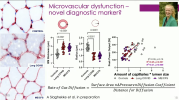| Title | Presenters | Start Time |
| Using fMRI and PET Imaging to Study Neuroinflammation in ME/CFS | Michael VanElzakker Tufts University | 00:06:20 |
| Targeted Research: Autoantibody Treatments for ME/CFS and Long COVID | Carmen Scheibenbogen Institute of Medical Immunology at the Charity University of Medicine in Berlin, Germany | 00:34:22 |
| Comparative Analysis of Pre-Pandemic ME/CFS and Long COVID Cohorts: Phenotyping Insights and the Sipavibart Monoclonal Antibody Trial | Nancy Klimas Institute for Neuro Immune Medicine, Nova Southeastern University | 01:03:20 |
| Microcirculation, Microclots in PASC and ME/CFS | Resia Pretorius Stellenbosch University, South Africa | 02:26:20 |
| Block 2: Panel Q & A and Discussion | Moderator: Luis Graga, Faculty of Medicine, University of Lisbon. GlMM Foundation - Institute Gulbenkian for Molecular Medicine
Michael VanElzakker
Nancy Klimas
Resia Pretorius | 02:58:50 |
| Microvascular and Mitochondrial Abnormalities in Skeletal Muscle in ME/SFC and Long COVID | Rob Wüst Assistant-professor at the Department of Human Movement Sciences at the VU University Amsterdam | 03:28:52 |
| Using a 2-day CPET Protocol for Evidence of Impairment in Fatiguing Illnesses | Betsy Keller PhD Department of Exercise Science and Athletic Training: Ithaca College, NY | 05:35:24 |
| Block 3: Panel Q & A and Discussion | Moderator: Filipe Froes, Public Health National Council, Portugal and Advisory Committee on Public Health Emergencies, European Commission
Rob Wüst
Betsy Keller | 06:02:35 |
| Neurovascular dysrcgulation, Preload Failure, Mitochondrial Dysfunction | David Systrom Dyspnea Center & Advanced Cardiopulmonary Exercise Testing Program, BWH; Harvard Medical School | 06:14:47 |
| Subclassifying Long COVID through Exercise Testing | Joao Carlos Winck Pulmonology Unit, CUF Porto Institute and Faculty of Medicine, University of Porto | 06:39:23 |
| Evaluation of the Effect of Pyridostigmine on Long COVID: Results of a Brazilian Randomized, Double-Blind, Controlled Clinical Study | Rudolf Oliveira Department of Medicine at the Federal University of Sao Paulo (UNIFESP) in Sao Paulo, Brazil | 07:00:22 |
| Long COVID and Pulmonary Hypertension and Other Suspected Cardiopulmonary Co-morbidities | Aaron Waxman Director of Pulmonary Vascular Disease Croup BWH; Harvard Medical School | 07:33:48 |
| Block 4: Panel Q&A and Discussion Moderator: | Filipe Froes, Public Health National Council, Portugal and Advisory Committee on Public Health Emergencies, European Commission
Aaron Waxman
Joao Carlos Winck
Rudolf Oliveira
David Systrom | 08:02:52 |
 aliancamillionsmissing.org
aliancamillionsmissing.org


